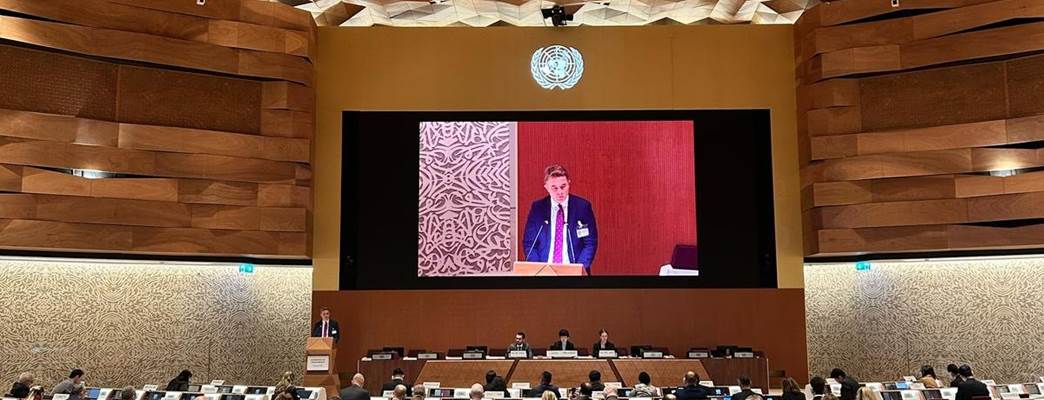President,
Global tensions are running high. The global security architecture is under tremendous pressure.
In 2022 Russia brutally attacked Ukraine from behind a shield of nuclear weapons. In three years, nuclear threats from Russia have become commonplace. Since the onset of this illegal war, we have also witnessed Russian use of chemical weapons in Ukraine in blatant violation of the Chemical Weapons Treaty. Russia continues to undermine the global bulwark against biological weapons through its incessant disinformation campaign against Ukraine, the US and others.
Russia’s actions do not just represent a threat to regional and global security, they endanger the very integrity of our shared disarmament framework. Disinformation, obstructionism, and blatant violations further erode these hard-won norms. As we mark the centenary of the Geneva Protocol and the 50th anniversary of the BTWC’s entry into force this month, let us reaffirm our commitment to upholding and strengthening the norm against use of weapons of mass destruction.
The Comprehensive Nuclear-Test-Ban Treaty is key to achieving a world without nuclear weapons. Norway and Panama are serving as co-Presidents of the Article XIV Conference and are leading efforts to promote the Treaty’s universalisation and entry into force. Russia’s decision to withdraw its ratification of the Treaty is deeply regrettable.
The New START treaty is the last remaining nuclear arms control treaty between the two major nuclear powers in the world. Less than a year from now New START will formally expire.
Russia, the United States and China have neither succeeded in establishing proper talks about arms control, nor strategic stability. China is rapidly, and with no transparency, expanding its nuclear arsenal. These actions risk setting off a new nuclear arms race.
The dire situation is compounded by the DPRK’s continuing pursuit of its nuclear and missiles programmes in violation of international law, as well as by Iran’s continued enrichment of uranium.
So, what does the future hold, then, for nuclear disarmament, non-proliferation and arms control? The Pact for the Future, agreed last year, shows that common ground is possible even in times of great tension. President Trump stated in Davos recently that he would be interested in resuming nuclear disarmament talks with Russia and China. This is encouraging. We urge China and Russia to reciprocate.
To achieve nuclear disarmament there is one ingredient that is nearly indispensable: verification. Verification builds confidence that all parties are upholding their obligations. It is essential not only for achieving disarmament—taking us to zero—but also for maintaining a disarmed world once nuclear weapons are dismantled.
Verification has also proven to be one of the areas where continued cooperation between all states with nuclear weapons, and non-nuclear weapons states, has been possible. The work on verification has been a confidence-building measure in itself.
Norway has chaired two UN Groups of Governmental Experts (GGEs) on this topic. Importantly, both GGEs produced substantive outcome reports by consensus. Building on this work, the next logical step is to establish a Group of Scientific and Technical Experts – a “GSTE” -- on nuclear disarmament verification within the UN.
Brazil and Norway launched a resolution to this effect at the UN last fall, establishing a series of consultations this spring. We invite all states to join these discussions on the merits, modalities and mandate of a prospective verification GSTE within the UN.
Achieving real disarmament requires political will. By laying the groundwork now, we can be ready to seize the next window of opportunity when it arises.
President,
The use of explosive weapons in populated areas causes enormous and lasting civilian harm. Ukraine and Gaza are but two bleak examples. In this context, the EWIPA Political Declaration is absolutely key. It commits us to do more to protect civilians. We strongly encourage all states to endorse the declaration.
The Conventions on Cluster Munitions (CCM) and Anti-Personnel Landmines (APLC) have saved countless lives and prevented massive human suffering. Disarmament conventions are not just commitments that apply in peacetime. In a time of rearmament and rising tensions, adherence to these norms is all the more essential. We encourage all states that have not yet done so to sign and ratify these conventions.
Autonomy in weapons systems poses serious legal, ethical, humanitarian and military concerns. Norway supports the work of the Group of Governmental Experts on Lethal Autonomous Weapons Systems (GGE LAWS). However, there is growing impatience with the group. Rightly so. We must accelerate our work by agreeing in 2025 on a set of significant elements of an instrument to ensure meaningful human control over such weapon systems.
Finally, president
Inclusivity and transparency are key pillars of multilateralism. I would like to stress the importance of promoting gender equality and broad-based participation in disarmament processes. We once again deplore the exclusion of a large number of UN member states from observing this year’s session of the CD. This flies in the face of these very principles as well as the CD’s own rules of procedure.
Thank you.
